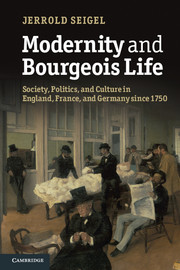 Modernity and Bourgeois Life
Modernity and Bourgeois Life Book contents
- Frontmatter
- Contents
- Illustrations
- Preface
- 1 Introduction: ends and means
- Part I Contours of modernity
- 2 Precocious integration: England
- 3 Monarchical centralization, privilege, and conflict: France
- 4 Localism, state-building, and bürgerliche Gesellschaft: Germany
- 5 Modern industry, class, and party politics in nineteenth-century England
- 6 France and bourgeois France: from teleocracy to autonomy
- 7 One special path: modern industry, politics, and bourgeois life in Germany
- Part II Calculations and lifeworlds
- 9 Men and women
- 10 Bourgeois morals: from Victorianism to modern sexuality
- 11 Jews as bourgeois and network people
- Part III A culture of means
- 13 Bourgeois and others
- 14 Bourgeois life and the avant-garde
- 15 Conclusion
- Notes
- Index
2 - Precocious integration: England
Published online by Cambridge University Press: 05 June 2012
- Frontmatter
- Contents
- Illustrations
- Preface
- 1 Introduction: ends and means
- Part I Contours of modernity
- 2 Precocious integration: England
- 3 Monarchical centralization, privilege, and conflict: France
- 4 Localism, state-building, and bürgerliche Gesellschaft: Germany
- 5 Modern industry, class, and party politics in nineteenth-century England
- 6 France and bourgeois France: from teleocracy to autonomy
- 7 One special path: modern industry, politics, and bourgeois life in Germany
- Part II Calculations and lifeworlds
- 9 Men and women
- 10 Bourgeois morals: from Victorianism to modern sexuality
- 11 Jews as bourgeois and network people
- Part III A culture of means
- 13 Bourgeois and others
- 14 Bourgeois life and the avant-garde
- 15 Conclusion
- Notes
- Index
Summary
The most bourgeois country and the least
From the perspective just proposed modernity appears both as a singular thing, “everywhere the same,” as Hegel said of spirit, and as a plurality of diverse things, markedly different from place to place. Among the most significant differences were the contributions bourgeois people and activities made to the evolving life around them and the ways this larger context shaped bourgeois or middle-class existence. These contrasts were firmly rooted in earlier history.
National feeling in the sense some nineteenth-century people would celebrate (and others decry) was at best embryonic before 1750, but some explicit consciousness of national identity existed in all three of the countries on which I focus here (and in others too), grounded in various mixes of political, economic, or cultural (including religious) relations. To be sure, some of these ties connected people to inhabitants of other countries as well, but this is a point we must leave aside for now. If we were simply to rank the three in terms of the level of consolidation each had achieved by around 1750, there would be good reason to put England at the top, Germany at the bottom, and France between them. But such a quantitative ranking is less informative than a more qualitative comparison, based on the differing modes of integration each territory had developed. An illuminating way to highlight these differences is to note that each one displayed some characteristic paradox, a distinctive, and in some way surprising, set of relations between elements of society and culture; these paradoxes gave a specific tonality to each country’s story and shaped the space occupied by bourgeois or middle class people and activities within it. I will argue in this and the next two chapters that each of these paradoxes was rooted in the kinds of relations with co-nationals at a distance that operated in each instance, and thus in the particular configuration of networks of means through which these connections were established.
- Type
- Chapter
- Information
- Modernity and Bourgeois LifeSociety, Politics, and Culture in England, France and Germany since 1750, pp. 41 - 72Publisher: Cambridge University PressPrint publication year: 2012


